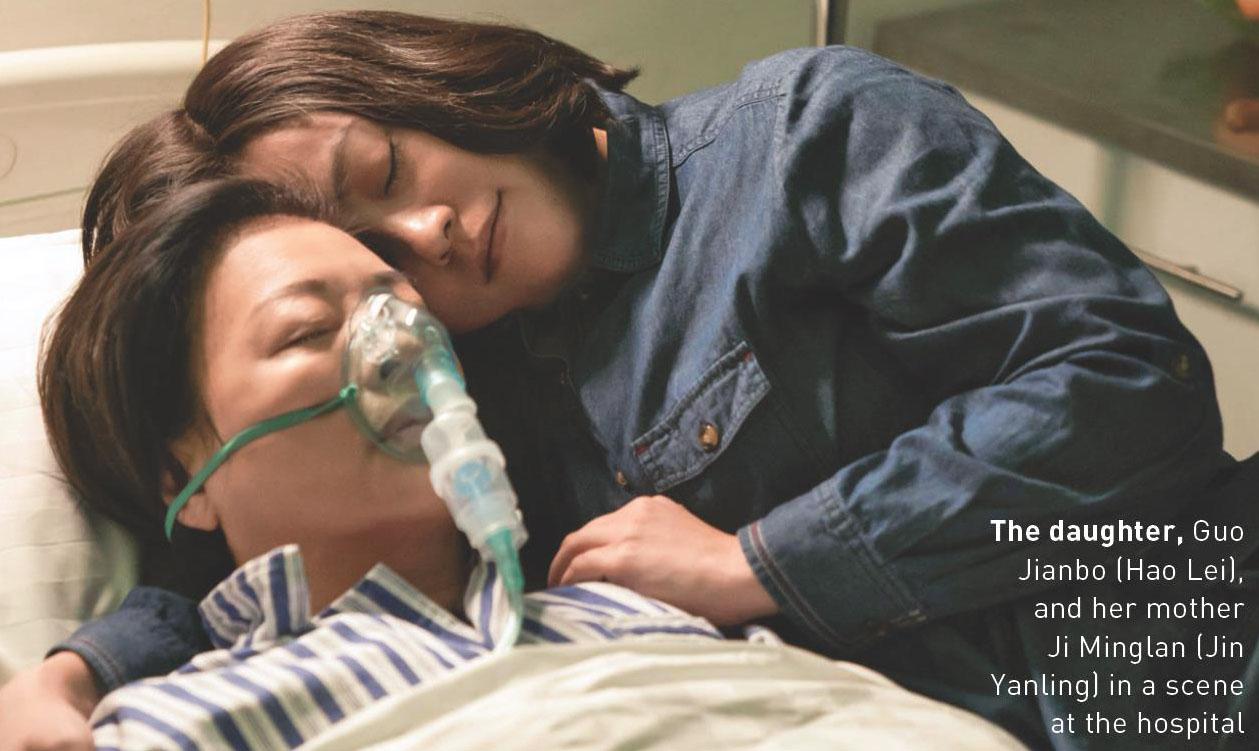MATERNAL INSTINCT

Whether it is in movies or literature, Chinese mothers tend to be portrayed as selfless, caring, devoted, and hardworking. Perhaps to please Chinas censors, who are notoriously keen to safeguard “family values,” mainstream creators tend to extol great maternal love, beautiful mother-child relationships, and the value of filial piety in their works.
But mothers can also be angry, resentful, and hostile, and this is the reality that director and screenwriter Yang Lina explores in Spring Tide. Released on May 17 on video platform iQiyi due to the Covid-19 pandemic, the acclaimed film explores the multigenerational mother-daughter conflicts between journalist GuoJianbo (Hao Lei), her widowed mother JiMinglan (Jin Yanling), and Guos daughter Wanting (QuJunxi), a fourth-grader.
The tagline on the films poster reads, “Your relationship with your mother determines your relationship with the world.” In this sense, Guo must have been fighting against the world for every minute of her life. A single mother, Guo lives in an old apartment together with her daughter and her own mother, JiMinglan, a retired journalist who became a community cadre. In public, Guo acts as a strong-minded and capable professional, but once at home, she becomes a passive and resentful daughter suffering from a lifetime of her mothers verbal abuse.
Though Guo almost never talks back to Ji directly, her silences showcase a continuous passive rebellion toward her mother and the audience. Actress Hao Lei contributes her best performance in several scenes where she doesnt have any lines: Guo, full of hate, putting out a cigarette on a dumpling wrapper after being criticized for smoking; grasping a cactus with her bare hands, neurotically twisting as blood seeps between her fingers while her mother swears at her continually; and, when her mother sets her up with a man, sending vulgar messages to scare him away.
Ironically, mother Ji also has two faces: among neighbors and friends, she is polite, helpful, and well respected; but in front of her daughter, she becomes emotional, acerbic, and cruel. When she hurts her daughter again and again, its clear that she knows what she is doing. “I have never seen a person as shameless as you!” she tells Guo in one scene—and means it.
It takes courage to portray hatred and cruelty between family members, and its even harder to outline a probable reason. Jis hostility toward her daughter is complicated and paradoxical: Ji doesnt accept Guo as her family, and complains about her daughter living in her apartment, because she believes a woman at Guos age is supposed to be married. Concurrently, there is Jis troubled relationship with her own mother when she was young and her resentment over an unhappy marriage, which resulted in the daughter who inherited the surname of her husband, the man Ji believes had destroyed her life.
“Every family has a pair of invisible hands, shaping everyones personality. Its very hard to change,” says actress Hao in an interview with Douban, arguing that the family in the film is a snapshot of Chinese society. Its hard to say whether the tragic circle would be broken. Guo, to some extent, fails to become a good mother as well—her sensible daughter, with whom she has a close relationship most of the time, resents Guos frequent absences due to work deep down, and prefers the moody grandmother.
The character of Guos father is the most interesting of the movie, though he never appears on screen. Just like in the famous Japanese movieRashomon, the characters have conflicting memories about him. According to Ji, her husband is a pervert who was arrested for exhibitionism and sexual assault, but Guo remembers him as a gentle father whose wife reported him to the police and taught their daughter to hate him. The movie (spoiler alert) never reveals whose testimony is true, and, unlike most family films, has no “hug and release” resolution. Instead, a seven-minute monologue by Guo indicates that she may be trying to let go of the past, but could also signify that nothing will change.
It isnt a flawless film: Spring Tide is rated 7.2 out of 10 on Douban, which is above average but unspectacular. There are critics who take issue with the different accents used by three actors playing members of the same family, and others who find the storyline too unfocused to follow. Fans, though, have rallied to the films defense: “If you dont understand the movie, it only means that you are lucky enough to have a happy family.”
–SUN JIAHUI(孙佳慧)
Its so quiet. When youre quiet, the world is also quiet. Lets just stay quietly like this for a while. If you wake up, youll start swearing at me with the dirtiest, most vicious words you can find. You always say Ill get my comeuppance. What kind of mother says that to her daughter? What is it that you think I deserve?
H2o `nj#ng a. N@ `nj#ng le zh-gesh#ji- ji& `nj#ng le. Ji& r3ng w6men zh-y3ng `nj#ng de d`iy!hu#rba. R%gu6 n@ x@ngl1i y!d#nghu# m3 w6, y7ng zu# `ngz`ng -d% de y^y1n l1i zh7um3 w6. N@ z6ngshi shu4 w6 hu# z`o b3oying, n2y6u m`ma zh-y3ng du# z#j@ n)'9r shu4 de?N@ q~d3i w6 hu# z`od3o sh9nme y3ng de b3oying?
好安靜啊。你安静了这个世界就安静了。就让我们这样安静地待一会儿吧。如果你醒来一定会骂我,用最肮脏恶毒的语言来咒骂我。你总是说我会遭报应,哪有妈妈这样对自己女儿说的?你期待我会遭到什么样的报应?
MUST-SEE MOVIES AND SERIES

